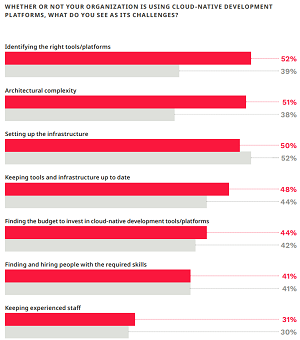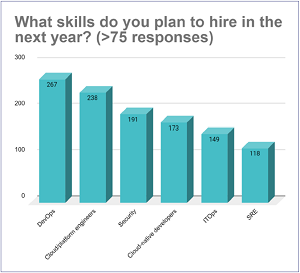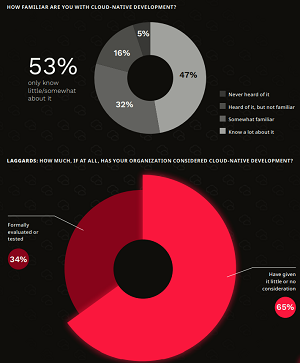News
Survey: 'Knowledge Gap' and Talent Dearth Hinder Cloud-Native Development
In gauging the benefits and challenges of cloud-native development, OutSystems found most respondents to a survey don't know that much about the approach, even though analysts predict it will pretty much account for all app development in a few years.
That finding comes in a report published last week by the low-code specialist titled "Cloud-Native Development: Ready or Not? What IT Executives and Developers Say."
Basically, what they say is that most aren't real familiar with cloud-native development -- even though they expect it to soon be used for most of their apps -- and organizations are still hindered by a talent dearth, along with some unexpected challenges.
The company boiled down the above into three bullet-point highlights:
- Knowledge Gap: While 72 percent of respondents expect that the majority of their apps will be created using cloud-native development by 2023, only 47 percent of them know a lot about it.
- Unexpected Challenges: Cloud-native leaders say that selecting the right tools/platforms (52 percent), and architectural complexity (51 percent) are the top two challenges of cloud-native development, whereas cloud-native laggards rank these significantly lower.
- Talent Need: Both cloud-native leaders and laggards agree that engineering team growth is a necessity -- and a struggle. Respondents share the need for talent across 13 different roles, from back-end, full-stack, and mobile developers to enterprise architects and designers, with cloud architects standing out as a critical role to fill.
That last point about a lack of hard-to-find skills is a common refrain we've seen over the past few years over a variety of tech sectors, which for some reason shows no signs of slowing down. The persistent trend is echoed in recent articles like:
It seems OutSystems is well aware of the trend, also.
"Not surprisingly, IT leaders feel a need for more -- and 77 percent more specialized -- talent to see their cloud-native strategies through," the report said. "Both leaders and laggards agree that engineering team growth is both required and a struggle. Respondents share the need for talent across 13 different roles, from back-end, full-stack, and mobile developers to enterprise architects and designers, with cloud architects standing out as a critical role to fill. The good news is that at a time when most companies are struggling to hire and retain technical talent, cloud-native leaders see the technology as a potential benefit for staff engagement. 44 percent of leaders confirm that cloud-native development creates 'interesting' work that emphasizes innovation over tedium."
Among the top challenges, "Finding and hiring people with the required skills" and "Keeping experienced staff" rank in the top seven, as depicted in this graphic:
 [Click on image for larger view.] Whether or Not Your Organization Is Using Cloud-Native Development Platforms, What Do You See As Its Challenges? (source: OutSystems).
[Click on image for larger view.] Whether or Not Your Organization Is Using Cloud-Native Development Platforms, What Do You See As Its Challenges? (source: OutSystems).
As far as the list of roles for which they seek talent, eight of them include the word "developer" or "architect."
That jives with a recent report on cloud-native skills in demand for 2022, which shows "Cloud-native developers" as the No. 4 skill for which organizations plan to hire this year:
 [Click on image for larger view.] In-Demand Skills (source: Platform9).
[Click on image for larger view.] In-Demand Skills (source: Platform9).
For the record, OutSystems defines cloud-native development as "applications designed from the ground up to take advantage of the benefits of a cloud computing infrastructure: flexibility, scale, resilience and elasticity."
That's apparently instructive to many respondents, despite the great expectations for the scheme among analysts ("analysts expect nearly all apps to be built using cloud-native development by the end of 2025") and even respondents ("72 percent of respondents expect that the majority of their apps will be created using cloud-native development by 2023").
"However, while the growth in cloud-native development is universally expected, 53 percent of all respondents still claim to be, at best, 'somewhat familiar' with the topic," the report said. "This lack of knowledge is likely behind the lack of action. When looking at cloud-native laggards, just over one in three (34 percent) have formally evaluated the technology. Half (50 percent) have engaged only in informal analysis, and 15 percent of laggards have given it no consideration at all."
 [Click on image for larger view.] "It's Time to Get to Know Cloud-Native" (source: OutSystems).
[Click on image for larger view.] "It's Time to Get to Know Cloud-Native" (source: OutSystems).
"Cloud-native technology unlocks new possibilities for application speed, reliability and massive scale -- if it's done right," said Patrick Jean, CTO of OutSystems, in a news release. "Many businesses are showing a delta between their desired future state and their current knowledge and expertise. Our research reveals that most businesses don't know enough about cloud-native's challenges and don't have the staff to successfully implement it."
Both in the news release and the survey-based report, the low-code specialist indicated that low-code tools can help.
In explaining the methodology behind the report, the company said it's based on a survey of 505 information technology decision-makers and developers spanning enterprises, commercial companies and small businesses around the world, with research technology company Lucid (a Cint Group Company) conducting an online survey in February 2022 across the United States, Europe, Australia, Latin America, Canada and Singapore.
About the Author
David Ramel is an editor and writer at Converge 360.